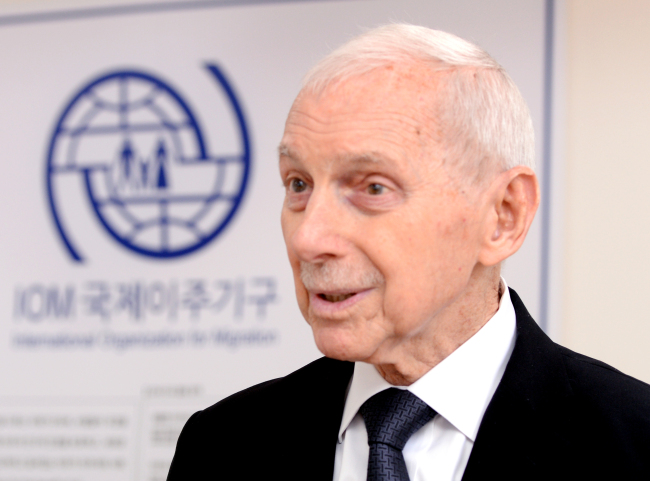[Herald Interview] ‘Accepting migrants is in national interest’: IOM chief
By Ock Hyun-juPublished : May 17, 2018 - 16:03
For countries faced with a population decline, taking in migrants is not only necessary, but also desirable, provided that creative immigration policies are implemented, says the UN migration agency’s chief.
William Lacy Swing, director general of the International Organization for Migration, warned against widespread anti-immigration and anti-refugee sentiment around the world, saying it is based on “false stereotypes and unfounded fear.”
“People say … we don’t want any migrants, build a wall and burn the bridge,” the former US diplomat said in an interview with The Korea Herald at the IOM’s Seoul Office. “They identify them (migrants) as ‘the other.’ That is a big fear.”
The prolonged economic slump and terrorist attacks around the globe have worsened negative sentiment toward immigrants and asylum seekers. Populism is also on the rise, with radical groups feeding off public anxiety over immigration.
“It is very toxic in nature, built on a lot of false stereotypes that they are coming to take our jobs and bringing in criminal elements, probably bringing in diseases. None of which was proved,” he said. “You cannot blame people. People need (correct) information.”

Swing, who has helmed the IOM since 2008 and whose term ends in June, was in South Korea for a four-day visit from May 9 to meet with South Korean officials from the Justice Ministry, Foreign Ministry and NGOs that support migrants.
He pointed out that migration is inevitable because of the global divide between the North in need of workforce and the South in need of jobs, education and opportunities, as well as ongoing armed conflicts and climate change.
“It (migration) is inevitable, but also necessary. It is in national interest. And it is absolutely desirable if we have the right policies rather than being stuck in the past,” he said, advising governments to use their visa systems more “resourcefully.”
“Because we know that migrants, over many years, have always contributed to our economies and societies. They are often very highly motivated than some of our nationals are. Many of them have family back home to feed and educate. They are also paying taxes,” he said. “Migrants are ultimate agents of development."
According to a report published by McKinsey Global Institute in 2016, the world’s 247 million cross-border migrants, accounting for 3.4 percent of the world’s population, contributed 9.4 percent of global gross domestic product, or roughly $6.7 trillion worldwide -- some $3 trillion more than they would have produced in their origin countries as of 2015.
Regarding Korea, which is experiencing a population crisis with the world’s lowest birthrate, Swing said, “South Korea would need more migrant workers. Robots don’t pay taxes.”
As armed-conflicts and humanitarian crises from Africa to Southeast Asia continue to forcibly displace millions of people from their homes, the IOM has been promoting humane migration, curbing human trafficking, resettling refugees and providing humanitarian assistance since its foundation in 1951. South Korea joined the 169-member organization in 1988.
The IOM’s Korea office opened in 1999 on the back of the rising number of migrant workers in South Korea.
According to UN data, there were 244 million people living outside their country of birth in 2017, an increase of 40 percent since 2000. Some 65.6 million people were forcibly displaced worldwide at the end of 2016. A total of 5,376 migrants were dead on migratory routes in 2017.
“They are one of the most unwanted populations in the world and therefore there should continue to be a lot of human sympathy for them,” he said. “There is a lot of hard work to do. But we should not lost hope on this.”
(laeticia.ock@heraldcorp.com)
-
Articles by Ock Hyun-ju








![[KH Explains] How should Korea adjust its trade defenses against Chinese EVs?](http://res.heraldm.com/phpwas/restmb_idxmake.php?idx=644&simg=/content/image/2024/04/15/20240415050562_0.jpg&u=20240415144419)











![[Today’s K-pop] Stray Kids to return soon: report](http://res.heraldm.com/phpwas/restmb_idxmake.php?idx=642&simg=/content/image/2024/04/16/20240416050713_0.jpg&u=)